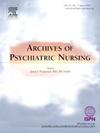Is artificial intelligence an opportunity or a threat in nursing care?: An in-depth phenomenological study
IF 2.2
4区 医学
Q1 NURSING
引用次数: 0
Abstract
Introduction
In the contemporary landscape, the use of artificial intelligence (AI) in nursing care has sparked ongoing debates regarding its merits and drawbacks.
Aim
This study endeavored to elucidate the perceptions of nurses regarding whether AI should be construed as an opportunity or a threat in the context of patient care delivery.
Methods
A qualitative, descriptive, phenomenological design was used. The study was conducted at a university hospital from December 15, 2023, to January 1, 2024. Employing a purposive sampling method, the study achieved data saturation after interviews with 13 nurses. Qualitative data were gathered using a semi-structured interview form, and content analysis was conducted following the procedural steps outlined in Colaizzi's phenomenological data analysis.
Results
In the course of the study, four distinct categories emerged: “Nursing Care Practices”, “Diagnosis and Treatment Processes”, “Management in Nursing”, and “Nursing Education and Research”. Within the category of “Nursing Care Practices”, a detailed examination revealed three overarching themes, each encompassing 15 sub-themes. These themes were “ethical and legal dimensions”, “positive thoughts”, and “negative thoughts”.
Conclusion
This study reveals that the nurses believed that “AI can support, facilitate, and enhance nursing care when implemented within defined parameters and under appropriate oversight.” The same participants conceptualized AI as a positive tool that augments clinical decision-making processes. These findings suggest that the integration of AI, when guided by ethical considerations and patient safety protocols, is a promising avenue for advancing the delivery of nursing care.
求助全文
约1分钟内获得全文
求助全文
来源期刊
CiteScore
3.70
自引率
0.00%
发文量
131
审稿时长
160 days
期刊介绍:
Archives of Psychiatric Nursing disseminates original, peer-reviewed research that is of interest to psychiatric and mental health care nurses. The field is considered in its broadest perspective, including theory, practice and research applications related to all ages, special populations, settings, and interdisciplinary collaborations in both the public and private sectors. Through critical study, expositions, and review of practice, Archives of Psychiatric Nursing is a medium for clinical scholarship to provide theoretical linkages among diverse areas of practice.

 求助内容:
求助内容: 应助结果提醒方式:
应助结果提醒方式:


